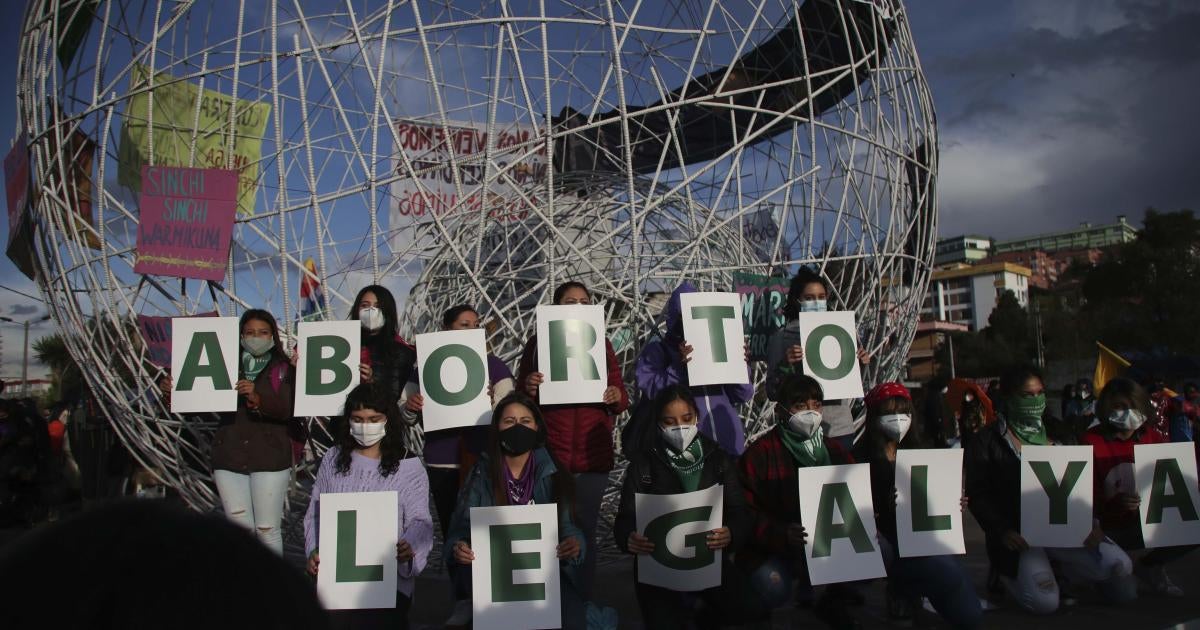Ecuador Should Ensure Abortion Access in Rape Cases
Lucía was 15 when a stranger raped her as she walked home from school.

The rape resulted in a pregnancy and in June 2015 Lucia gave birth alone in the bathroom of her home, where the baby died. She was convicted of homicide and sentenced to five years in prison. She spent four years and three months in a juvenile facility. A bill is before the National Assembly that will guarantee effective access to abortion in cases of rape, and passing it should be a priority.
The final bill should not include practical barriers to accessing care such as gestational limits and reporting requirements.
The bill should regulate conscientious objection to prevent it from hindering timely abortion access and require health personnel to protect patient confidentiality. If the bill meets these standards, President Guillermo Lasso should approve it. He initially said he would respect the Constitutional Court ruling last April that decriminalized abortion for anyone who is pregnant as a result of rape. But recent statements that he will veto the bill are a worrying U-turn with serious implications.
The situation is a bit complicated.
The Justice Commission was responsible for drafting a bill to carry out the court order. Last December, a majority of members approved and presented a bill that complied with international standards. But it wasn’t approved by the National Assembly. On February 3, the Commission submitted two drafts. A minority supported a second bill with many barriers and conditions that would undermine access to abortion in these cases.
The Assembly suspended discussion and asked the commission to submit a new bill. On February 11, the Justice Commission passed, with a majority vote, a new text of the bill. Under the law, Guadalupe Llori, the National Assembly president, must call the Plenary to vote.
The bill will need 70 votes to be approved. If this happens, the bill will be sent to President Lasso, who will be able to approve or veto the law partially or totally.
The assembly should pass a bill that would provide protection to anyone who is pregnant because of a rape, and president Lasso should approve it, to bring Ecuador into compliance with its international human rights obligations; and tackle a serious public health problem. According to Health Ministry data, almost 10 percent of maternal deaths in 2019 and 6 percent in 2020 were a consequence of unsafe abortion. Lucia, whose name I have changed along with others for their protection, is not alone. Human Rights Watch, for a recent report, reviewed 148 cases of women, girls, health providers, and partners charged with abortion in Ecuador from 2009 to 2019. Of those, 120 cases were against women and girls.
The cases were stark examples of how the criminalization of abortion has a devastating impact on the lives and health of women and girls who are already marginalized and who seek essential reproductive health services. Many of the women and girls prosecuted had in fact experienced miscarriages or obstetric emergencies. María, 20 years old, had a miscarriage after slipping and felling down the stairs at work. She was arrested for allegedly having an abortion after doctors reported her to the police. Maria spent four months in a prison cell with her 3-year-old son while awaiting trial. Other women and girls were charged after seeking post-abortion care. Seventy-three percent of the cases we reviewed were initiated after a health care provider reported a patient to the police, violating medical confidentiality.
These include Delfina, 17, and Josefa, 21, both of whom had miscarriages in 2014 and went to the emergency room seeking medical care. Delfina spent 18 months under house arrest while on trial. Josefa served a 7-month prison sentence. In 66 percent of the cases, police interrogated women at the hospital without a lawyer. In some cases, punishment seemed intended to reinforce religious beliefs and gender norms: a number of women were sentenced to community service in orphanages or to therapy intended to make them good mothers. Authoritative interpretations of human rights treaties ratified by Ecuador, have long established that highly restrictive abortion laws violate the human rights of women and girls.
The United Nations Committee on the Elimination of Discrimination against Women in its 2021 review of Ecuador’s compliance with the treaty, recommended that it legalize abortion in cases of rape, risk to the life or health of the pregnant woman, or “severe fetal impairment”; decriminalize abortion in all other cases; and provide women and girls with access to safe abortion and post-abortion services.
The National Assembly and President Lasso have a landmark opportunity to end Ecuador’s discriminatory denial of access to abortion and to enable women and girls to realize their right to comprehensive sexual and reproductive health services after sexual violence. It is a chance for Ecuador to stop needlessly punishing women and girls and start protecting them.
Read the full article at the original website
References:
- https://www.hrw.org/es/news/2022/01/10/carta-de-hrw-la-comision-de-justicia-de-la-asamblea-nacional-de-ecuador
- http://esacc.corteconstitucional.gob.ec/storage/api/v1/10_DWL_FL/e2NhcnBldGE6J3RyYW1pdGUnLCB1dWlkOidiZGE2NDE0YS1jNDI1LTQzMGMtYWViNi1jYjY0ODQ1YTQ2NWUucGRmJ30=
- https://www.hrw.org/news/2021/05/27/ecuador-implement-constitutional-court-rulings-protecting-rights
- https://www.elcomercio.com/actualidad/politica/lasso-decision-corte-constitucional-aborto.html
- https://www.elcomercio.com/actualidad/aprueba-informe-primer-debate-ley-aborto-por-violacion.html
- https://www.elcomercio.com/actualidad/politica/asambleistas-voto-plazos-aborto-violacion.html
- https://www.elcomercio.com/actualidad/politica/cambios-informe-ley-aborto-violacion-victimas-ecuador.html
- https://www.hrw.org/news/2017/07/24/qa-human-rights-law-and-access-abortion
- https://www.salud.gob.ec/wp-content/uploads/2020/01/Gaceta-SE-50-MM.pdf
- https://www.salud.gob.ec/wp-content/uploads/2021/01/Gaceta-SE-53-MM.pdf
- https://www.hrw.org/americas/ecuador
- https://www.hrw.org/report/2021/07/14/why-do-they-want-make-me-suffer-again/impact-abortion-prosecutions-ecuador
- https://documents-dds-ny.un.org/doc/UNDOC/GEN/N21/353/95/PDF/N2135395.pdf?OpenElement
